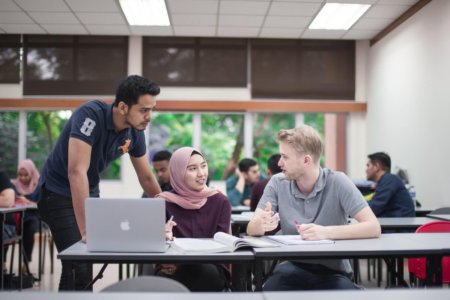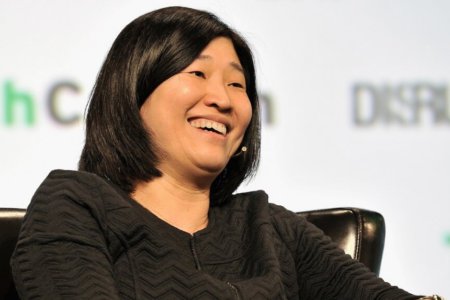China Europe International Business School (CEIBS) is the top pick for global graduate education within Asia. Why? For one, it is the first business school in the Chinese mainland to be accredited by both the European Quality Improvement System (EQUIS) and Association to Advance Collegiate Schools of Business (AACSB). It’s also ranked by industry tome, the Financial Times, as being the #5 in the world for their Master in Business Administration (MBA) and Executive Master in Business Administration (EMBA) programmes two years running.
As a prospective B-School student, you’re probably wondering how these rankings translate into an enriching educational graduate experience. Great question: Their MBA offers a China-focused module that allows you to study general business management, or you can concentrate in Finance, Marketing, Digital Business, or Entrepreneurship over 12 to 18 months. Their EMBA program develops widely-applicable leadership and analytical skills in 20 months. Both programmes are delivered by faculty members from all over the world, who strengthen business insights with their global perspectives.
Due to pandemic-related travel restrictions, international students from the 2020 MBA cohort who could not enter China instead started their first term at the CEIBS campus in beautiful Zurich, Switzerland. This twin-city format allows for face-to-face instruction to carry on despite external circumstances.

Source: China Europe International Business School (CEIBS)
Incoming graduate student Wich Kamloonwaysarach from Thailand is looking forward to the networking opportunities and mentorship programmes of the MBA. He applauds CEIBS for helping students overcome pandemic difficulties, opining, “Though handling the pandemic may not be part of the MBA programme, this experience gives us an overview of what business looks like in the real world – full of uncertainty.”
Diverse, digital, dynamic international business school
For Malaysian intake Melissa Khoo, her class of 2021 mates are the best part of the MBA programme. “My cohort comprises 23 different nationalities and a wide range of professions such as consultants, accountants, investment bankers, and entrepreneurs. Due to the smaller class size of about 170 students, we enjoy a more intimate classroom setting and have more opportunities to engage with each other on a more personal level. My classmates are extremely welcoming and have eased my move to China, helping me build a new home in a foreign country,” shares the senior manager at Accenture.
This diversity is key to the digital edge of the MBA and EMBA programmes. Students can access support and resources at the CEIBS eLab in the Shanghai campus, which serves as an incubator for entrepreneurial ventures. The MBA Entrepreneurship & Investment Camp and the eLab Incubation Program are among the opportunities you’ll have to develop greater knowledge and skills in venture creation, investment, and digital technology. This eLab has birthed 100 business ventures so far, with more in the works. An integral part of CIEBS is ensuring that students make connections, whether to bring your business idea to life or establish cross-border human interactions.

Source: China Europe International Business School (CEIBS)
“CEIBS’ alumni base is a vast yet closely-knit community and we got several chances to meet the alumni and current batches of the Global EMBA and the MBA classes,” recalls Rishabh Jit Ralhan from India. “Apart from these, there were many mixers with students from other B-Schools. We also had job fairs with company executives and recruiters – some even interviewed suitable candidates.” Since graduating in 2020, the cricket and football player has landed his dream job working for Amazon in Shenzhen.
Tapping into a global innovation hub
According to Khoo, China’s emphasis on technology and innovation to drive economic growth paves the way for business transformation and breakthroughs. “CEIBS MBA has offered the platform for me to learn about these cases through classroom case discussions, experiential China modules and executive forums. As China is ahead of other Asian countries in terms of technology adoption and innovation, I believe there are transferable experiences and knowledge here that can be applied to other markets. Thus, CEIBS MBA has definitely deepened my understanding of China – which would enable me to tap into the knowledge gained to drive transformation across the Asia Pacific region,” she says.
Ralhan concurs: “Shanghai is one of the most foreigner-friendly cities in the world. The infrastructure, the right mix of Chinese and western urban culture in the city makes it perfect for any foreigner to live in. Also, as the business and financial capital of China, all companies have their offices here and we get opportunities to network with high-profile executives from the world’s top companies.”

Source: China Europe International Business School (CEIBS)
As part of the MBA, students complete a capstone project called the Integrated China Strategy Project (ICSP), which all featured students recognise as a formative practical learning experience. This is when MBA candidates work with existing companies for up to six months, solving real-world issues in diverse teams.
“While the experiences vary upon companies and content the teams work with, the opportunity to work as a team for a corporate project was most enriching” attests Robin Tay from Singapore, who now works at Dupont in Shanghai. Among his notable MBA field experiences were visiting Nanjing to learn about the globalisation strategies of Chinese firms, as well as checking out the vibrant start-up ecosystem in Tel Aviv.
With its global industry edge and future-focused modules, the prestigious China Europe International Business School equips ambitious business leaders for the next phase of their career, no matter where they come from. Apply for the 2021 intake to become a part of this experience.
You can also sign up for 1-to-1 consultation session with the MBA Admissions team here.
Follow CEIBS on Facebook, Twitter, Instagram, YouTube and LinkedIn, or connect via WeChat and Weibo












